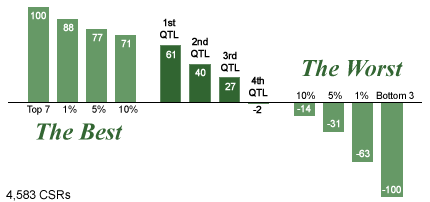Want to realize the best return on that expensive new CRM system you just installed? Then make sure you have talented people using it.
Picture this: A company invests a great deal of time, effort, and money in a state-of-the-art customer relationship management (CRM) system, and it doesn’t work. Sound familiar? It should. According to some reports, an estimated half of all CRM projects fail.
Why does this happen? Here’s a clue. Technology isn’t usually the problem -- most CRM systems are solid. Instead, it’s a people failure. Frequently, companies install CRM systems because they want to increase their call center’s performance while enhancing revenue. Companies that understand their customers will sell more -- at least, that’s what CRM systems seem to promise. Unfortunately, all too often, companies and their call centers relearn an old lesson: Computers don’t know anything.
People know things. Computers are essentially like robots, effective at doing repetitive and tedious tasks, like digging up information far more quickly and accurately than a person can. But it takes a person to apply that knowledge effectively. Value creation in a call center occurs during the person-to-person interactions between customers and customer service representatives (CSRs). No CRM system can replace that.
Admittedly, a manager’s life would be easier if CRM systems could replace people. And if the past is any guide, companies will continue to hope that CRM systems can take over more parts of the CSR role. But for now, center managers who want to get the most out of their centers must focus on the agent, not the technology.
A little history may help explain how centers developed their current management attitudes. Call centers started as a cost-reduction effort, one made possible through new technology. The basic idea was to decrease the number of back-office employees who spent time answering the phone or making calls, concentrating these responsibilities with just a few people. Most businesses’ attitude could be summed up as, "Somebody -- anybody -- answer that phone, so we can get some work done around here!"
As technology advanced, most businesses’ attitudes evolved, too, taking on a new twist: "If we could just put all of the information on the computer and hook it into the phone system, then we wouldn’t need experts to answer the phone." Anybody could work in a call center, because the system would provide all the answers. And having information readily available did help some call center reps, mostly the ones that were already good at what they did. But technology did not help all CSRs. Those reps who were not very good on the phone didn’t benefit from the improved technology -- in fact, many of them got worse at their job, not better.
Let’s look at some data that may clarify the situation. The chart below shows how individual CSRs perform with customers -- the best estimate of value creation for a call center. As the chart reveals, the top seven CSRs work with customers so well that every customer they interact with feels more loyal to the company after talking with them. Thus, they create tremendous value for their employer. Customers that talk with the three worst CRS have a far different experience. These CSRs don’t create value -- they destroy it, by making 100% of the customers they handle less loyal to the company.
 |
So how does this relate to CRM systems? Very directly. All of the CSRs whose performance data are shown in the chart below use one of the most sophisticated and capable CRM systems in the world. But some of them use it far more effectively than others do.
How can this be? In the well established tradition of improved performance through technological advancement, the point of a CRM system -- or perhaps the promise -- is that anyone can sit in the call center’s seats and turn customer calls into cash for the company.
Realistically, the CSRs who handle these customer calls will create or destroy value, in spite of the CRM. And the reason is straightforward. The more complex the task, the more talented a CSR must be to succeed. CRM systems add complexity to the CSR’s job. Not only must CSRs be able to establish great relationships with customers over the phone, they must also be able to navigate the myriad possibilities that the typical CRM system throws at them.
What does this all mean for managers who want to realize the value promised by most CRM systems? Well, those managers must give up the notion that anyone can be a CSR. Managers who want a CRM system to succeed must consider workforce requirements before and ahead of technical requirements. They must make a commitment to finding the right people and offering them a career path as a CSR before making a commitment to technology.
Managers who shift their call centers to CSR-focused management can realize center-wide performance gains. And that means real money. After all, CSRs will create the value for the company -- not the CRM.
